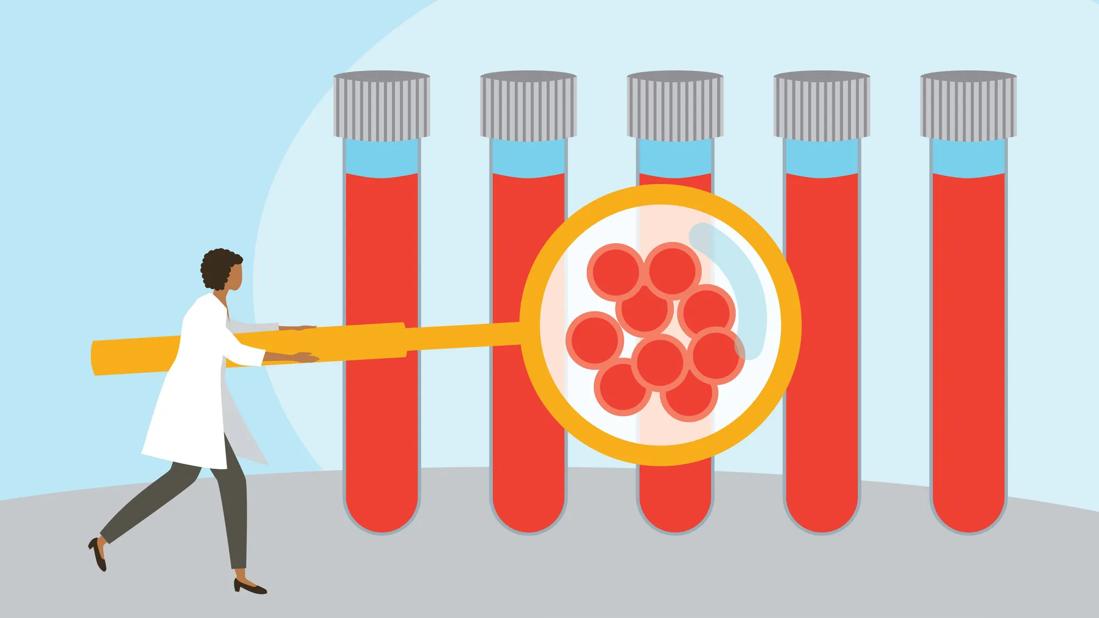Fewer than 50 people have ever been found to have golden blood, a genetic change that’s also called Rh null blood

Image content: This image is available to view online.
View image online (https://assets.clevelandclinic.org/transform/4097ef0a-4177-4431-bccf-48c1514b9140/tech-examines-blood-1346146365)
Technician with oversized magnifying glass examining oversized vials of blood
If you’ve ever spent much time looking into blood types, you were probably led to believe there are eight of them: A+, A-, B+, B-, AB+, AB-, O+ and O-.
Advertisement
Cleveland Clinic is a non-profit academic medical center. Advertising on our site helps support our mission. We do not endorse non-Cleveland Clinic products or services. Policy
But that’s oversimplifying things quite a bit.
There are rare blood types that go beyond these best-known ones — and people with so-called “golden blood” are the rarest of the rare. (And since you're wondering, no, it’s not about blood that’s yellow or gold in color.)
Transfusion medicine physician Zaher Otrock, MD, explains what makes golden blood so special.
Golden blood is the rarest kind of blood known in the world. It’s also called Rh null blood, and about 43 people have ever been reported to have it.
"The name ‘golden blood’ can sound like this is blood that’s somehow more pure or safe for transfusions,” Dr. Otrock shares. “But that name is just a popular term to convey how rare Rh null blood is. Not that it’s in any way a ‘better’ type of blood.”
Golden blood happens because of an extremely rare genetic mutation, or change. But understanding what exactly it is takes a little understanding of the science of categorizing blood.
Let’s take a closer look.
Blood types are determined using the ABO and Rh (Rhesus factor) blood group systems. It goes a little something like this:
Lab tests look for A and B antigens covering your red blood cells. Antigens are particles that your immune system will attack if it’s not familiar with them.
Advertisement
The test also looks at your blood Rh factor. Specifically, it looks at an antigen called RhD.
Now, here’s where golden blood comes in.
RhD isn’t the only antigen in the Rh system. There are actually more than 50 different Rh antigens.
People with Rh null blood, or golden blood, don’t have any of the Rh antigens.
“We test for RhD because it’s the one that’s most likely to trigger an immune reaction,” Dr. Otrock explains. “In that sense, it’s the most important and clinically significant of the Rh antigens. But it’s definitely not the only one to consider.”
Rh null blood is sometimes called a universal donor for people with rare or multiple Rh antibodies — even more flexible than O-. But it’s far harder to find.
On the flip side, it can be dangerous for people who live with golden blood to receive a blood transfusion from anyone who also isn’t Rh null.
“For people who live with Rh null blood, the best options would be to donate and freeze their blood to use in case of planned surgeries and to carefully manage things like anemia (low blood count) with measures like iron or folic acid to avoid transfusions whenever possible,” Dr. Otrock advises.
What’s the danger? Remember how golden blood doesn’t have any Rh antigens in it? Other blood types do.
O- blood doesn’t contain the A, B or RhD antigens. So, most people’s immune systems will accept it as safe.
But O- blood still contains other Rh antigens. So, if it’s donated to someone with golden blood, their immune system could mount a defense against it.
Blood compatibility depends on your immune system accepting donated blood as something that’s safe. If you receive blood that has an antigen your body doesn’t recognize, it can result in a transfusion reaction and cause issues like:
If left untreated, blood incompatibility can be life-threatening.
Golden blood is a real — and incredibly rare — part of human biology. While most people will never encounter Rh null blood, learning about it reveals just how complex and fascinating our blood, and our bodies, really are.
Advertisement

Sign up for our Health Essentials emails for expert guidance on nutrition, fitness, sleep, skin care and more.
Learn more about our editorial process.
Advertisement
Your veins might look blue, but that’s not the color of the blood flowing inside
People of any blood type can receive donations of Type O-negative blood
Focus on eating iron-rich foods and hydrating
A flexible pumping schedule, the right gear and a few smart habits can make pumping at work smoother and more successful
They claim to boost energy and improve longevity, but there’s currently not enough research to confirm these benefits
You may be surprised to learn that acupuncture usually doesn’t feel like anything — and any discomfort is typically brief
Most teething symptoms are mild — fevers and other major symptoms are likely something else
Dressing in multiple layers, drinking warm liquids and taking breaks indoors can help prevent these cold-weather injuries
Prioritize your health by managing stress, strengthening your social connections and getting quality sleep
Bolsters, blankets, pillows and blocks can offer extra support, stability and comfort
Allergies, postnasal drip, asthma or reflux could be to blame for a cough that won’t quit